Premium Only Content

The Power Elites Who Ruined Big Media and Politics
The dark side of history: https://thememoryhole.substack.com/
Michael Wolff (born August 27, 1953) is an American journalist, as well as a columnist and contributor to USA Today, The Hollywood Reporter, and the UK edition of GQ.[2] He has received two National Magazine Awards, a Mirror Award, and has authored seven books, including Burn Rate (1998) about his own dot-com company, and The Man Who Owns the News (2008), a biography of Rupert Murdoch. He co-founded the news aggregation website Newser and is a former editor of Adweek.
On January 5, 2018, Wolff's book Fire and Fury: Inside the Trump White House was published, containing unflattering descriptions of behavior by U.S. President Donald Trump, chaotic interactions among the White House senior staff, and derogatory comments about the Trump family by former White House Chief Strategist Steve Bannon.[3] The book quickly became a New York Times number-one bestseller[4] and became the first of a trilogy about Trump in power, the other two books being Siege (2019) and Landslide (2021).[5]
Early life
Michael Wolff was born in Paterson, New Jersey, the son of, Jewish,[6] Lewis Allen Wolff (1920–1984),[7] an advertising professional, and Marguerite (Vanderwerf) "Van" Wolff (1925–2012)[8] a reporter for Paterson Evening News.[9][10] Wolff graduated from Montclair Academy (now Montclair Kimberley Academy) in 1971, where he was student council president in his senior year.[11] He attended Vassar College and transferred to Columbia University, from which he graduated in 1975.[12][13] While a student at Columbia, he worked for The New York Times as a copy boy.[14][15]
Career
1970s
He published his first magazine article in the New York Times Magazine in 1974: a profile of Angela Atwood, a neighbor of his family who helped kidnap Patricia Hearst as a member of the Symbionese Liberation Army. Shortly afterward, he left the Times and became a contributing writer to the New Times, a bi-weekly news magazine started by Jon Larsen and George Hirsch. Wolff's first book was White Kids (1979), a collection of essays.
1990s
In 1991, Wolff launched Michael Wolff & Company, Inc., specializing in book-packaging. Its first project, Where We Stand, was a book with a companion PBS series. The company's next major project was creating one of the first guides to the Internet, albeit in book form. Net Guide was published by Random House.[16]
In the fall of 1998, Wolff published a book, Burn Rate, which recounted the details of the financing, positioning, personalities, and ultimate breakdown of Wolff's start-up Internet company, Wolff New Media. The book became a bestseller. In its review of Wolff's book Burn Rate, Brill's Content criticized Wolff for "apparent factual errors" and said that 13 people, including subjects he mentioned, complained that Wolff had "invented or changed quotes".[17]
In August 1998, Wolff was recruited by New York magazine to write a weekly column. Over the next six years, he wrote more than 300 columns [18] that included criticism of the entrepreneur Steven Brill, the media banker Steven Rattner, and the book publisher Judith Regan.[19][20][21]
2000s
Wolff at the 2008 Monaco Media Forum
Wolff was nominated for the National Magazine Award three times, winning twice.[22] His second National Magazine Award was for a series of columns he wrote from the media center in the Persian Gulf as the Iraq War started in 2003. His book, Autumn of the Moguls (2004),[23] which predicted the mainstream media crisis[clarification needed] that hit later in the decade, was based on many of his New York magazine columns.
In 2004, when New York magazine's owners, Primedia Inc., put the magazine up for sale, Wolff helped assemble a group of investors, including New York Daily News publisher Mortimer Zuckerman, Hollywood producer Harvey Weinstein, and financier Jeffrey Epstein to back him in acquiring the magazine.[24][25][26] Although the group believed it had made a successful bid, Primedia decided to sell the magazine to the investment banker Bruce Wasserstein.[27][26]
In a 2004 cover story for The New Republic, Michelle Cottle wrote that Wolff was "uninterested in the working press," preferring to focus on "the power players—the moguls" and was "fixated on culture, style, buzz, and money, money, money." She also noted that "the scenes in his columns aren’t recreated so much as created—springing from Wolff’s imagination rather than from actual knowledge of events," calling his writing "a whirlwind of flourishes and tangents and asides that often stray so far from the central point that you begin to wonder whether there is a central point."[28]
In 2005, Wolff joined Vanity Fair as its media columnist.[29][30] In 2007, with Patrick Spain, the founder of Hoover's, and Caroline Miller, the former editor-in-chief of New York magazine, he launched Newser, a news aggregator website.[31]
That year, he also wrote a biography of Rupert Murdoch, The Man Who Owns the News, based on more than 50 hours of conversation with Murdoch and extensive access to his business associates and his family. The book was published in 2008.[32][33] Beginning in mid-2008, Wolff briefly worked as a weekly columnist for The Industry Standard, an Internet trade magazine published by IDG.[34] David Carr, in a review Business Insider's Maxwell Tani described as "scathing" wrote that Wolff was "far less circumspect" than most other journalists.[35][32]
2010s
Wolff received a 2010 Mirror Award in the category Best Commentary: Traditional Media for his work in Vanity Fair.[36]
In 2010, Wolff became editor of the advertising trade publication Adweek. He was asked to step down one year later, amid a disagreement as to "what this magazine should be".[37]
Fire and Fury
Main article: Fire and Fury
In early January 2018, Wolff's book Fire and Fury: Inside the Trump White House was published. Excerpts released before publication included unflattering descriptions of behavior by U.S. President Donald Trump, chaotic interactions among the White House senior staff, and derogatory comments about the Trump family by former White House Chief Strategist Steve Bannon.[3] News of the book's imminent publication and its embarrassing depiction of Trump prompted Trump and his lawyer, Charles Harder, to issue on January 4, 2018 a cease and desist letter alleging false statements, defamation, and malice, and to threaten libel lawsuits against Wolff, his publisher Henry Holt and Company, and Bannon, an action that actually stimulated pre-launch book sales.[38][39] On January 8, Henry Holt's attorney, Elizabeth McNamara, responded to Harder's allegations with an assurance that no apology or retraction would be forthcoming, while also noting that Harder's complaint cited no specific errors in Wolff's text.[40] John Sargent, the chief executive of Macmillan-Holt, informed the publisher's employees that "as citizens, we must demand that President Trump understand and abide by the First Amendment of our Constitution."[40]
According to other lawyers and a historian, threats of a lawsuit by Trump against a book author and publisher were unprecedented by a sitting president attempting to suppress freedom of speech protected by the U.S. First Amendment.[41][42] Before its release on January 5, the book and e-book reached number one both on Amazon.com and the Apple iBooks Store,[4] and by January 8, over one million books had been sold or ordered.[40]
Siege: Trump under Fire
Wolff's book, Siege: Trump Under Fire, was released on June 4, 2019. In it he claims that the Justice Department had drafted indictment documents against Trump in March 2018, accusing him of three criminal counts relating to interfering with a pending investigation and witness tampering. Special Counsel Robert Mueller is reported to have sat on these draft indictments for a year before deciding that Justice Department policy would prevent such an indictment.[43] "The documents described do not exist," Mueller spokesman Peter Carr said, referring to the purported three-count charging document against Trump.[44]
Nikki Haley controversy
While being interviewed during Fire and Fury's publicity tour Wolff said he was "absolutely sure" President Trump was having an affair and suggested on two occasions that his partner was Nikki Haley, the United States Ambassador to the United Nations.[45][46] Haley denied Wolff's allegations, calling them "disgusting". Erik Wemple of The Washington Post said that Wolff was engaging in a "remarkable multimedia slime job".[47] Bari Weiss in The New York Times said that Wolff was "gleefully" spreading "evidence-free detail".[48] On February 25, 2018, Wolff was interviewed by Ben Fordham on the Australian morning show Today, where he was asked about his claim that Trump was having an affair behind Melania Trump's back.[49] Wolff stated that he couldn't hear the question, prompting Fordham to repeat it and eventually asking "you're not hearing me, Mr. Wolff?" to which Wolff replied, "no, I'm not getting anything", before removing his ear piece and walking off the set.[50] Both Fordham and the Today show later tweeted a video that included the audio from the ear piece which revealed that the question could be heard.[51] Days earlier, after being pressed about the rumor in a college press tour interview, Wolff stated "I do not know if the president is having an affair" and added "this is the last thing I say about it".[52]
Criticism
This article's "criticism" or "controversy" section may compromise the article's neutrality. Please help rewrite or integrate negative information to other sections. (January 2023)
The Columbia Journalism Review criticized Wolff in 2010 for suggesting that The New York Times was aggressively covering the breaking News International phone hacking scandal as a way of attacking News Corporation chairman Rupert Murdoch.[53] The Guardian criticized Wolff's book Too Famous for the way it portrayed controversial celebrities including Steve Bannon, Jeffrey Epstein, and Christopher Hitchens.[54]
Several people have denied quotes published in Fire and Fury. These people include Tom Barrack, Tony Blair, Katie Walsh, and Anna Wintour.[55][56][57]Sean Hannity also denied that he let Donald Trump review questions before interviewing him.[55]
Columnist David Brooks questioned Wolff's credibility since Wolff has been known to not check his facts. Brooks expressed doubts about Wolff's journalistic methods and conveyed skepticism over the accuracy of Fire and Fury.[58]
The View host Meghan McCain criticized Wolff for publishing an off the record conversation with Roger Ailes in Fire and Fury.[59][60]
Journalist Steven Rattner referred to Wolff as an “unprincipled writer of fiction.”[61]
Alan Dershowitz criticized Wolff's book Siege: Trump Under Fire, calling it fiction. Wolff wrote in the book that Dershowitz had a dinner with Donald Trump at the White House to discuss the possibility of representing him. However Dershowitz claimed this dinner never happened.[62]
PolitiFact writer Angie Drobnic Holan noted that Fire and Fury contains several factual errors, including that Trump did not know who John Boehner was in 2016 (Trump had tweeted about Boehner in 2015) and that Wilbur Ross was Trump's choice for US Secretary of Labor (rather than Secretary of Commerce).[63]
Some questioned Wolff using Sam Nunberg as a source in Fire and Fury since Nunberg had admitted to fabricating a story about Chris Christie in the past.[64]
Books
White Kids. Simon & Schuster. 1979. ISBN 978-0-671-40001-9.
Where We Stand: Can America Make It in the Global Race for Wealth, Health, and Happiness?. Bantam Books. 1992. ISBN 978-0-553-08119-0.
Burn Rate: How I Survived the Gold Rush Years on the Internet. Simon & Schuster. 1998. ISBN 978-0-684-85621-6.
Autumn of the Moguls: My Misadventures With the Titans, Poseurs, and Money Guys Who Mastered and Messed Up Big Media. HarperCollins. 2003. ISBN 978-0-06-662113-5.
The Man Who Owns the News: Inside the Secret World of Rupert Murdoch. Broadway Books. 2008. ISBN 978-0-385-52612-8.
Television Is the New Television: The Unexpected Triumph of Old Media In the Digital Age. Penguin. 2015. ISBN 978-1-59184-813-4.
Fire and Fury: Inside the Trump White House. Henry Holt. 2018. ISBN 978-1-250-15806-2.
Siege: Trump Under Fire. Henry Holt. 2019. ISBN 978-1-250-25382-8.
Landslide: The Final Days of the Trump Presidency. Henry Holt. 2021. ISBN 978-1-250-83001-2.
The Fall: The End of Fox News and the Murdoch Dynasty. Henry Holt. 2023. ISBN 978-1-250-87927-1.
Personal life
Wolff was formerly married to lawyer Alison Anthoine. Wolff and Antoine are parents of three children. He is now married to Victoria Floethe, and they have two children. [65][66]
Wolff and Floethe are parents of Louise Wolff, born in 2015.[67]
His daughter, Susanna Wolff, was the editor-in-chief of CollegeHumor.[68][69]
Wolff is known for his pugnacious personality, and has reportedly been ejected from numerous New York City restaurants.[65][66][67]
References
"Wolff, Michael, 1953–". id.loc.gov. Retrieved January 5, 2018.
Conrad, Anna (December 20, 2017). ""author:Michael Wolff" search results". British GQ. Archived from the original on January 8, 2018. Retrieved January 7, 2018.
Hartmann, Margaret (January 4, 2018). "Trump Tries to Stop Publication of Wolff Book, Hits Bannon With Cease-and-Desist". New York. Retrieved January 5, 2018.
Stelter, Brian (January 4, 2018). "Michael Wolff's Trump book hits #1 on Amazon, publisher speeds up rollout plan". CNNMoney.
Green, Lloyd (July 13, 2021). "Landslide review: Michael Wolff's third Trump book is his best – and most alarming". The Guardian. Guardian News & Media Limited. Retrieved April 5, 2022.
Ben Welch (February 26, 2018). "Was The Fire and the Fury author Michael Wolff lying about Tony Blair's Trump job?". The Jewish Chronicle. Retrieved July 22, 2018.
U.S., Social Security Death Index, 1935–2014, Ancestry
Wolff, Michael (May 20, 2012). "A Life Worth Ending". NYMag.com.
Presinzano, Jessica (January 6, 2018). "Michael Wolff: 5 things to know about the 'Fire and Fury' author". North Jersey.
"Marguerite Wolff Obituary". The Record/Herald News. September 20, 2012.
Oguss, Elizabeth; and Moss, Linda. "Michael Wolff, author of Trump book, graduated from private Montclair HS", Montclair Local, January 8, 2018. Accessed January 24, 2018. "Author Michael Wolff, whose controversial book stirred President Donald Trump to angrily tweet to defend his 'stable genius,' was president of his high school student council—and his high school was in Montclair. Wolff, who continues to defend the veracity of Fire and Fury: Inside The Trump White House, graduated from Montclair Academy in 1971."
Bronski, Peter (Winter 2011). "Media Moguls". Vassar, the Alumnae/i Quarterly. Retrieved January 6, 2018.
""FIRE AND FURY" AUTHOR MICHAEL WOLFF CC'75 SPARKS CONTROVERSY WITH WHITE HOUSE ACCOUNT". Columbia College Alumni Association. Retrieved December 21, 2020.
Konviser, Bruce (January 5, 2018). "Michael Wolff: Who is the 'Fire and Fury' author?". Deutsche Welle.
Concha, Joe (January 5, 2018). "Who is 'Fire and Fury' author Michael Wolff?". The Hill.
ASIN 0440223903
"The Truth About Burn Rate". October 1998. Archived from the original on July 18, 2012.
Michael Wolff Archive – New York Magazine. Nymag.com. Retrieved December 30, 2011.
Neyfakh, Leon (December 15, 2008). "Michael Wolff Wonders: Why's Judith Regan After the Spotlight Again?". The New York Observer. Retrieved December 30, 2011.
Koblin, John (October 26, 2008). "Cold Case File: The Missing Daily News Steve Rattner Maureen White Story". The New York Observer. Retrieved December 30, 2011.
Kurtz, Howard (May 30, 2001). "New York's Media Hound; Columnist Michael Wolff Stalks the Pack and Goes for the Throat". The Washington Post.
National Magazine Awards Archived September 2, 2010, at the Wayback Machine. Cursor.org. Retrieved December 30, 2011.
Wolff, Michael (September 16, 2004). Autumn of the Moguls: My Misadventures with the Titans, Poseurs, and Money Guys Who Mastered and Messed Up Big Media. Harper Business. ISBN 978-0-06-662110-4. "Michael Wolff autumn of moguls."
Yglesias, Matthew. (October 23, 2003) "Who needs New York magazine?", Slate Magazine, Retrieved December 30, 2011.
Carr, David (December 15, 2003). "Bid for New York Magazine: A Dance of Money and Ego". The New York Times. Retrieved May 12, 2010.
"Lazard's Clash of the Titans". Vanity Fair. April 2005. Retrieved November 13, 2023. "Outside of the bank, [Bruce] Wasserstein still runs his investment fund, and in December 2003 he pulled off an astonishing dawn raid in the bidding war for the purchase of New York magazine from Henry Kravis's Primedia, snatching it away for $55 million from a consortium that included the publisher and real-estate investor Mort Zuckerman, filmmaker Harvey Weinstein, columnist Michael Wolff (now a V.F. contributing editor), and financier Jeffrey Epstein."
"Michael Wolff, On His Own (But Not Really)", Media Features – Media]. Women's Wear Daily (WWD), July 2, 2009). Retrieved December 30, 2011.
Cottle, Michelle (August 29, 2004). "Wolff Trapped". The New Republic.
Wolff, Michael (November 2009). "Big Bad Wolff". Vanity Fair. Retrieved December 30, 2011.
Wolff, Michael (October 15, 2009). "Big Bad Wolff". The Hive | Vanity Fair.
"Can Michael Wolff's Newser colonize the news frontier?". Los Angeles Times blog. Archived from the original on May 9, 2009. Retrieved May 12, 2010.
Carr, David (December 28, 2008). "Plowing Through the Door". The New York Times. Retrieved May 12, 2010.
ASIN 0385526121
"The Industry Standard Announces Powerful Editorial Line-Up; Renowned Author Michael Wolff And Web Pioneer Carl Steadman To Pen Weekly Columns For IDG Weekly". Mmit.stc.sh.cn (April 15, 1998). Retrieved December 30, 2011.
"The writer of the explosive new book on Trump is getting eviscerated over its accuracy – and it's not the first time". Business Insider.
Alvarez, Alex (June 10, 2010). "The Mirror Awards: A Reflection On Media's Most Meta Awards Ceremony". Adweek.
Peters, Jeremy W. (October 17, 2011). "Michael Wolff Steps Down as Editor of Adweek". The New York Times.
Stelter, Brian (January 4, 2018). "President Trump tries to quash bombshell book". CNNMoney. Retrieved January 6, 2018.
Canfield, Michael (January 4, 2018). "Michael Wolff Trump book defies cease and desist order, bumps up release to Friday". Entertainment. Retrieved January 5, 2018.
Alter, Alexandra (January 8, 2018). "Publisher Defied Trump to 'Defend the Principles of the First Amendment'". The New York Times. Retrieved January 9, 2018.
Boutrous, Ted; Kidder, Teddy (January 4, 2018). "There's No Way Trump Can Stop Wolff From Publishing His Book". Politico: Law and Order. Retrieved January 6, 2018.
Parker, Ashley; Dawsey, Josh (January 4, 2018). "Trump's effort to stop publication of scathing book is a break in precedent". The Washington Post. Retrieved January 5, 2018.
Elving, Ron (May 29, 2019). "Michael Wolff's New Trump Tell-All 'Siege,' Stars Steve Bannon And A Cast Of No-Names". NPR. Retrieved May 29, 2019.
Helmore, Edward (May 28, 2019). "Mueller drew up obstruction indictment against Trump, Michael Wolff book says". The Guardian. Retrieved May 29, 2019.
"An affair with Trump? Nikki Haley on 'disgusting' rumors and her rise to a top foreign policy role". Politico.
Sorkin, Amy Davidson (February 1, 2018). "Michael Wolff Gets Called Out for "Slurring" Nikki Haley". The New Yorker.
Wemple, Erik (February 27, 2018). "Michael Wolff should just apologize". The Washington Post.
Weiss, Bari (2018). "The Slut-Shaming of Nikki Haley". The New York Times.
Osborne, Samuel (February 26, 2018). "Michael Wolff claims he can't hear TV interviewer's questions about Trump affair allegations". The Independent. Archived from the original on May 14, 2022. Retrieved October 2, 2019.
Kimmorley, Sarah (February 26, 2018). "'Fire and Fury' author Michael Wolff ended a live TV interview after question about his claims Trump is having an affair". businessinsider.com. Business Insider Australia. Retrieved October 2, 2019.
Lanktree, Graham (February 26, 2018). "Michael Wolff Walks Out of Interview After Host Asks Him to Apologize to Donald Trump". Newsweek. Retrieved October 2, 2019.
"Trump critic Michael Wolff scraps Dutch appearances after contentious interview". NL Times. February 23, 2018.
Chittum, Ryan (September 7, 2010). "Michael Wolff's High Cynicism". Columbia Journalism Review. Retrieved January 4, 2018.
Conrad, Peter (October 31, 2021). "Too Famous by Michael Wolff review – a sneering apologist for the notorious". The Observer. ISSN 0029-7712. Retrieved February 17, 2023.
"These claims in Michael Wolff's explosive new Trump book are being challenged". www.cbsnews.com. January 5, 2018. Retrieved September 18, 2021.
Corcoran, Rob Price, Kieran. "Anna Wintour denies claim in explosive Trump book she asked to be made US ambassador to UK". Business Insider. Retrieved September 18, 2021.
"Trump book author responds to criticism that he embellished stories: 'If it rings true, it is true'". Business Insider. Retrieved December 31, 2021.
"Shields and Brooks on Russia revelations, Trump-Bannon rift". PBS NewsHour. January 5, 2018. Retrieved December 31, 2021.
Wilstein, Matt (January 10, 2018). "'The View' Host Meghan McCain Berates Michael Wolff: 'This Is Why People Hate Journalists'". The Daily Beast. Retrieved November 18, 2021.
"Meghan McCain Deserves Praise For Her Superb Line of Questioning For Michael Wolff". Mediaite. January 13, 2018. Retrieved November 18, 2021.
"Journalists scrutinize Michael Wolff's credibility". Politico. January 5, 2018. Retrieved September 18, 2021.
Tan, Anjelica (July 3, 2019). "Dershowitz: Author Michael Wolff fictionalized my dinner with Trump". The Hill. Retrieved September 21, 2021.
Washington, District of Columbia 1100 Connecticut Ave NW Suite 1300B; Dc 20036. "PolitiFact - A fact-checker's guide to Michael Wolff's 'Fire and Fury: Inside the Trump White House'". PolitiFact. Retrieved September 18, 2021.
Prokop, Andrew (January 4, 2018). "The controversy around Michael Wolff's gossipy new Trump book, explained". Vox. Retrieved September 18, 2021.
Grynbaum, Michael M. (January 5, 2018). "Michael Wolff, From Local Media Scourge to National Newsmaker". The New York Times. ISSN 0362-4331. Retrieved August 6, 2021.
Carmon, Irin (July 2, 2009). "Michael Wolff, On His Own (But Not Really)". WWD. Retrieved August 6, 2021.
Grynbaum, Michael M. "Trump author Michael Wolff: from local scourge to global spotlight". The Irish Times. Retrieved August 6, 2021.
Horgan, Richard (September 9, 2013). "Michael Wolff's Daughter is Now an Editor-in-Chief". AdWeek. Retrieved August 21, 2021.
"Around the Quads". Columbia College Today. Winter 2013. Retrieved August 21, 2021.
External links
Wikimedia Commons has media related to Michael Wolff.
Appearances on C-SPAN
Authority control databases Edit this at Wikidata
International
FAST ISNI VIAF
National
Norway Catalonia Germany Israel United States Japan Czech Republic Korea Netherlands Poland
Artists
MusicBrainz
Other
SNAC IdRef
Categories:
Vassar College alumniColumbia College (New York) alumniLiving peopleAmerican male journalistsWriters from Paterson, New JerseyAmerican columnistsAmerican biographers20th-century American Jews1953 birthsMontclair Kimberley Academy alumniNew York (magazine) peopleVanity Fair (magazine) peopleThe Hollywood Reporter peopleAmerican male biographers21st-century American Jews
Keith Rupert Murdoch AC KCSG (/ˈmɜːrdɒk/ MUR-dok; born 11 March 1931) is an Australian-born American business magnate, investor, and media proprietor.[2][3] Through his company News Corp, he is the owner of hundreds of local, national, and international publishing outlets around the world, including in the UK (The Sun and The Times), in Australia (The Daily Telegraph, Herald Sun, and The Australian), in the US (The Wall Street Journal and the New York Post), book publisher HarperCollins, and the television broadcasting channels Sky News Australia and Fox News (through the Fox Corporation). He was also the owner of Sky (until 2018), 21st Century Fox (until 2019), and the now-defunct News of the World. With a net worth of US$21.7 billion as of 2 March 2022, Murdoch is the 31st richest person in the United States and the 71st richest in the world according to Forbes magazine.[4]
After his father's death in 1952, Murdoch took over the running of The News, a small Adelaide newspaper owned by his father. In the 1950s and 1960s, Murdoch acquired a number of newspapers in Australia and New Zealand before expanding into the United Kingdom in 1969, taking over the News of the World, followed closely by The Sun. In 1974, Murdoch moved to New York City, to expand into the US market; however, he retained interests in Australia and the UK. In 1981, Murdoch bought The Times, his first British broadsheet, and, in 1985, became a naturalized US citizen, giving up his Australian citizenship, to satisfy the legal requirement for US television network ownership.[5] In 1986, keen to adopt newer electronic publishing technologies, Murdoch consolidated his UK printing operations in London, causing bitter industrial disputes. His holding company News Corporation acquired Twentieth Century Fox (1985), HarperCollins (1989),[6] and The Wall Street Journal (2007). Murdoch formed the British broadcaster BSkyB in 1990 and, during the 1990s, expanded into Asian networks and South American television. By 2000, Murdoch's News Corporation owned more than 800 companies in more than 50 countries, with a net worth of more than $5 billion.[7]
In July 2011, Murdoch faced allegations that his companies, including the News of the World, owned by News Corporation, had been regularly hacking the phones of celebrities, royalty, and public citizens. Murdoch faced police and government investigations into bribery and corruption by the British government and FBI investigations in the US.[8][9] On 21 July 2012, Murdoch resigned as a director of News International.[10][11] In September 2023, Murdoch announced he would be stepping down as chairman of Fox Corp. and News Corp.[12] Many of Murdoch's papers and television channels have been accused of biased and misleading coverage to support his business interests[13][14][15] and political allies,[16][17][18] and some have credited his influence with major political developments in the UK, US, and Australia.[16][19][20]
Early life
Keith Rupert Murdoch was born on 11 March 1931 in Melbourne, the second of four children of Sir Keith Murdoch (1885–1952) and Dame Elisabeth (née Greene; 1909–2012).[21][22]: 9 He is of English, Irish, and Scottish ancestry. His parents were also born in Melbourne. His father was a war correspondent and later a regional newspaper magnate owning two newspapers in Adelaide and a radio station in a remote mining town, and chairman of the Herald and Weekly Times publishing company.[5][23]: 16 [24] Murdoch had three sisters: Helen (1929–2004), Anne (born 1935) and Janet (born 1939).[25]: 47 His Scottish-born paternal grandfather, Patrick John Murdoch, was a Presbyterian minister.[26] Later in life, Murdoch chose to go by his second name, the first name of his maternal grandfather.
He attended Geelong Grammar School,[27] where he was co-editor of the school's official journal The Corian and editor of the student journal If Revived.[28][29] He took his school's cricket team to the National Junior Finals.[clarification needed] He worked part-time at the Melbourne Herald and was groomed by his father to take over the family business.[5][30] Murdoch studied Philosophy, Politics and Economics at Worcester College, Oxford, in England, where he kept a bust of Lenin in his rooms and came to be known as "Red Rupert". He was a member of the Oxford University Labour Party,[23]: 34 [30] stood for Secretary of the Labour Club[31] and managed Oxford Student Publications Limited, the publishing house of Cherwell.[32]
After his father's death from cancer in 1952, his mother did charity work as life governor of the Royal Women's Hospital in Melbourne and established the Murdoch Childrens Research Institute; at the age of 102 (in 2011), she had 74 descendants.[33] Murdoch then began working as a sub-editor with the Daily Express for two years.[5]
Activities in Australia and New Zealand
Journalist Sir Keith Murdoch (1885–1952), Rupert Murdoch's father
Following his father's death, when he was 21, Murdoch returned from Oxford to take charge of what was left of the family business. After liquidation of his father's Herald stake to pay taxes, what was left was News Limited, which had been established in 1923.[23]: 16 Rupert Murdoch turned its Adelaide newspaper, The News, its main asset, into a major success.[30] He began to direct his attention to acquisition and expansion, buying the troubled Sunday Times in Perth, Western Australia (1956) and over the next few years acquiring suburban and provincial newspapers in New South Wales, Queensland, Victoria and the Northern Territory, including the Sydney afternoon tabloid The Daily Mirror (1960). The Economist describes Murdoch as "inventing the modern tabloid",[34] as he developed a pattern for his newspapers, increasing sports and scandal coverage and adopting eye-catching headlines.[5]
Murdoch's first foray outside Australia involved the purchase of a controlling interest in the New Zealand daily The Dominion. In January 1964, while touring New Zealand with friends in a rented Morris Minor after sailing across the Tasman, Murdoch read of a takeover bid for the Wellington paper by the British-based Canadian newspaper magnate Lord Thomson of Fleet. On the spur of the moment, he launched a counter-bid. A four-way battle for control ensued in which the 32-year-old Murdoch was ultimately successful.[35] Later in 1964, Murdoch launched The Australian, Australia's first national daily newspaper, which was based first in Canberra and later in Sydney.[36] In 1972, Murdoch acquired the Sydney morning tabloid The Daily Telegraph from Australian media mogul Sir Frank Packer, who later regretted selling it to him.[37] In 1984, Murdoch was appointed Companion of the Order of Australia (AC) for services to publishing.[38]
After the Keating government relaxed media ownership laws, in 1986 Murdoch launched a takeover bid for The Herald and Weekly Times, which was the largest newspaper publisher in Australia.[39] There was a three-way takeover battle between Murdoch, Fairfax and Robert Holmes à Court, with Murdoch succeeding after agreeing to some divestments.
In 1999, Murdoch significantly expanded his music holdings in Australia by acquiring the controlling share in a leading Australian independent label, Michael Gudinski's Mushroom Records; he merged that with Festival Records, and the result was Festival Mushroom Records (FMR). Both Festival and FMR were managed by Murdoch's son James Murdoch for several years.[40]
Political activities in Australia
Murdoch found a political ally in Sir John McEwen, leader of the Australian Country Party (now known as the National Party of Australia), who was governing in coalition with the larger Menzies-Holt-Gorton Liberal Party. From the first issue of The Australian, Murdoch began taking McEwen's side in every issue that divided the long-serving coalition partners. (The Australian, 15 July 1964, first edition, front page: "Strain in Cabinet, Liberal-CP row flares.") It was an issue that threatened to split the coalition government and open the way for the stronger Australian Labor Party to dominate Australian politics. It was the beginning of a long campaign that served McEwen well.[41]
After McEwen and Menzies retired, Murdoch threw his growing power behind the Australian Labor Party under the leadership of Gough Whitlam and duly saw it elected[42] on a social platform that included universal free health care, free education for all Australians to tertiary level, recognition of the People's Republic of China, and public ownership of Australia's oil, gas and mineral resources. Rupert Murdoch's backing of Whitlam turned out to be brief. Murdoch had already started his short-lived National Star[41] newspaper in America, and was seeking to strengthen his political contacts there.[43]
Asked about the 2007 Australian federal election at News Corporation's annual general meeting in New York on 19 October 2007, its chairman Rupert Murdoch said: "I am not commenting on anything to do with Australian politics. I'm sorry. I always get into trouble when I do that." Pressed as to whether he believed Prime Minister John Howard should continue as prime minister, he said: "I have nothing further to say. I'm sorry. Read our editorials in the papers. It'll be the journalists who decide that – the editors."[44]
Murdoch described Howard's successor, Labor Party Prime Minister Kevin Rudd, as "more ambitious to lead the world [in tackling climate change] than to lead Australia" and criticised Rudd's expansionary fiscal policies in the wake of the financial crisis of 2007–2008 as unnecessary.[45] In 2009, in response to accusations by Rudd that News Limited was running vendettas against him and his government, Murdoch opined that Rudd was "oversensitive".[46] Although News Limited's interests are extensive, also including the Daily Telegraph, the Courier-Mail and the Adelaide Advertiser, it was suggested by the commentator Mungo MacCallum in The Monthly that "the anti-Rudd push, if coordinated at all, was almost certainly locally driven" as opposed to being directed by Murdoch, who also took a different position from local editors on such matters as climate change and stimulus packages to combat the financial crisis.[47]
Murdoch is a supporter of an Australian republic, having campaigned for such a change during the 1999 referendum.[48]
Activities in the United Kingdom
Business activities in the United Kingdom
Murdoch – World Economic Forum Annual Meeting in Davos, in 2007
In 1968, Murdoch entered the British newspaper market with his acquisition of the populist News of the World, followed in 1969 with the purchase of the struggling daily The Sun from IPC.[49] Murdoch turned The Sun into a tabloid format and reduced costs by using the same printing press for both newspapers. On acquiring it, he appointed Albert 'Larry' Lamb as editor and – Lamb recalled later – told him: "I want a tearaway paper with lots of tits in it". In 1997 The Sun attracted 10 million daily readers.[5] In 1981, Murdoch acquired the struggling Times and Sunday Times from Canadian newspaper publisher Lord Thomson of Fleet.[49] Ownership of The Times came to him through his relationship with Lord Thomson, who had grown tired of losing money on it as a result of an extended period of industrial action that stopped publication.[50] In the light of success and expansion at The Sun the owners believed that Murdoch could turn the papers around. Harold Evans, editor of the Sunday Times from 1967, was switched to the daily Times, though he stayed only a year amid editorial conflict with Murdoch.[51][52]
During the 1980s and early 1990s, Murdoch's publications were generally supportive of Britain's Prime Minister Margaret Thatcher.[53] At the end of the Thatcher/Major era, Murdoch switched his support to the Labour Party and its leader, Tony Blair. The closeness of his relationship with Blair and their secret meetings to discuss national policies was to become a political issue in Britain.[54] This later changed, with The Sun, in its English editions, publicly renouncing the ruling Labour government and lending its support to David Cameron's Conservative Party, which soon afterwards formed a coalition government. In Scotland, where the Conservatives had suffered a complete annihilation in 1997, the paper began to endorse the Scottish National Party (though not yet its flagship policy of independence), which soon after came to form the first-ever outright majority in the proportionally elected Scottish Parliament. Former Prime Minister Gordon Brown's official spokesman said in November 2009 that Brown and Murdoch "were in regular communication" and that "there is nothing unusual in the prime minister talking to Rupert Murdoch".[55]
In 1986, Murdoch introduced electronic production processes to his newspapers in Australia, Britain and the United States. The greater degree of automation led to significant reductions in the number of employees involved in the printing process. In England, the move roused the anger of the print unions, resulting in a long and often violent dispute that played out in Wapping, one of London's docklands areas, where Murdoch had installed the very latest electronic newspaper purpose-built publishing facility in an old warehouse.[56] The bitter Wapping dispute started with the dismissal of 6,000 employees who had gone on strike and resulted in street battles and demonstrations. Many on the political left in Britain alleged the collusion of Margaret Thatcher's Conservative government with Murdoch in the Wapping affair, as a way of damaging the British trade union movement.[57][58][59] In 1987, the dismissed workers accepted a settlement of £60 million.[5]
In 1998, Murdoch made an attempt to buy the football club Manchester United F.C.,[60] with an offer of £625 million, but this failed. It was the largest amount ever offered for a sports club. It was blocked by the United Kingdom's Competition Commission, which stated that the acquisition would have "hurt competition in the broadcast industry and the quality of British football".
Murdoch's British-based satellite network, Sky Television, incurred massive losses in its early years of operation. As with many of his other business interests, Sky was heavily subsidised by the profits generated by his other holdings, but convinced rival satellite operator British Satellite Broadcasting to accept a merger on his terms in 1990.[5] The merged company, BSkyB, has dominated the British pay-TV market ever since, pursuing direct to home (DTH) satellite broadcasting.[61] By 1996, BSkyB had more than 3.6 million subscribers, triple the number of cable customers in the UK.[5]
Murdoch has a seat on the Strategic Advisory Board of Genie Oil and Gas, having jointly invested with Lord Rothschild in a 5.5% stake in the company which conducted shale gas and oil exploration in Colorado, Mongolia, Israel and, controversially, the occupied Golan Heights.[62]
In response to print media's decline and the increasing influence of online journalism during the 2000s, Murdoch proclaimed his support of the micropayments model for obtaining revenue from on-line news,[63] although this has been criticised by some.[64]
In January 2018, the CMA blocked Murdoch from taking over the remaining 61% of BSkyB he did not already own, over fear of market dominance that could potentialise censorship of the media. His bid for BSkyB was later approved by the CMA as long as he sold Sky News to The Walt Disney Company, which was already set to acquire 21st Century Fox. However, it was Comcast who won control of BSkyB in a blind auction ordered by the CMA. Murdoch ultimately sold his 39% of BSkyB to Comcast.[65]
News Corporation has subsidiaries in the Bahamas, the Cayman Islands, the Channel Islands and the Virgin Islands. From 1986, News Corporation's annual tax bill averaged around seven percent of its profits.[66]
Political activities in United Kingdom
In Britain, in the 1980s, Murdoch formed a close alliance with Conservative prime minister Margaret Thatcher.[67] In February 1981, when Murdoch, already owner of The Sun and The News of the World, sought to buy The Times and The Sunday Times, Thatcher's government let his bid pass without referring it to the Monopolies and Mergers Commission, which was usual practice at the time.[68][69][70] Although contact between the two before this point had been explicitly denied in an official history of The Times, documents found in Thatcher's archives in 2012 revealed a secret meeting had taken place a month before in which Murdoch briefed Thatcher on his plans for the paper, such as taking on trade unions.[68][69][71]
The Sun credited itself with helping her successor John Major to win an unexpected election victory in the 1992 general election, which had been expected to end in a hung parliament or a narrow win for Labour, then led by Neil Kinnock.[67] In the general elections of 1997, 2001 and 2005, Murdoch's papers were either neutral or supported Labour under Tony Blair.[citation needed]
The Labour Party, from when Blair became leader in 1994, had moved from the centre-left to a more centrist position on many economic issues before 1997. Murdoch identifies himself as a libertarian, saying "What does libertarian mean? As much individual responsibility as possible, as little government as possible, as few rules as possible. But I'm not saying it should be taken to the absolute limit."[72]
In a speech he delivered in New York in 2005, Murdoch claimed that Blair described the BBC coverage of the Hurricane Katrina disaster, which was critical of the Bush administration's response, as full of hatred of America.[73]
On 28 June 2006, the BBC reported that Murdoch and News Corporation were considering backing new Conservative leader David Cameron at the next General Election – still up to four years away.[74] In a later interview in July 2006, when he was asked what he thought of the Conservative leader, Murdoch replied "Not much".[75] In a 2009 blog, it was suggested that in the aftermath of the News of the World phone hacking scandal, which might yet have transatlantic implications,[76] Murdoch and News Corporation might have decided to back Cameron.[77] Despite this, there had already been a convergence of interests between the two men over the muting of Britain's communications regulator Ofcom.[78]
In August 2008, Cameron accepted free flights to hold private talks and attend private parties with Murdoch on his yacht, the Rosehearty.[79] Cameron declared in the Commons register of interests he accepted a private plane provided by Murdoch's son-in-law, public relations guru Matthew Freud; Cameron did not reveal his talks with Murdoch. The gift of travel in Freud's Gulfstream IV private jet was valued at around £30,000. Other guests attending the "social events" included the then EU trade commissioner Lord Mandelson, the Russian oligarch Oleg Deripaska and co-chairman of NBC Universal Ben Silverman. The Conservatives did not disclose what was discussed.[80]
In July 2011, it emerged that Cameron had met key executives of Murdoch's News Corporation a total of 26 times during the 14 months that Cameron had served as Prime Minister up to that point.[81] It was also reported that Murdoch had given Cameron a personal guarantee that there would be no risk attached to hiring Andy Coulson, the former editor of News of the World, as the Conservative Party's communication director in 2007.[82] This was in spite of Coulson having resigned as editor over phone hacking by a reporter. Cameron chose to take Murdoch's advice, despite warnings from Deputy Prime Minister Nick Clegg, Lord Ashdown and The Guardian.[83] Coulson resigned his post in 2011 and was later arrested and questioned on allegations of further criminal activity at the News of the World, specifically the phone hacking scandal. As a result of the subsequent trial, Coulson was sentenced to 18 months in jail.[84]
In June 2016, The Sun supported Vote Leave in the United Kingdom European Union membership referendum. Murdoch called the Brexit result "wonderful", comparing the decision to withdraw from the EU to "a prison break….we're out".[85] Anthony Hilton, economics editor for the Evening Standard but describing a period when he interviewed Murdoch for The Guardian, quoted Murdoch as justifying his Euroscepticism with the words "When I go into Downing Street, they do what I say; when I go to Brussels, they take no notice".[86] Murdoch denied saying this later in a letter to the Guardian.[87][88]
With some exceptions, The Sun has generally been supportive of the government of Conservative Prime Minister Boris Johnson. Murdoch and his employees were the media representatives ministers from the Cabinet and Treasury most frequently held meetings during the first two years of Johnson's Government. However, newspaper circulation in general including among subsidiaries of News International fell sharply in the United Kingdom during the early 21st century, leading some commentators to suggest that Rupert Murdoch was not as influential in British political debate by the early 2020s as he had once been.[89][90][91]
News International phone hacking scandal
Main article: News International phone hacking scandal
In July 2011, Murdoch, along with his youngest son James, provided testimony before a British parliamentary committee regarding phone hacking. In the UK, his media empire came under fire, as investigators probed reports of 2011 phone hacking.[92]
On 14 July 2011 the Culture, Media and Sport Committee of the House of Commons served a summons on Murdoch, his son James, and his former CEO Rebekah Brooks to testify before a committee five days later.[93] After an initial refusal, the Murdochs confirmed they would attend, after the committee issued them a summons to Parliament.[94] The day before the committee, the website of the News Corporation publication The Sun was hacked, and a false story was posted on the front page claiming that Murdoch had died.[95] Murdoch described the day of the committee "the most humble day of my life". He argued that since he ran a global business of 53,000 employees and that News of the World was "just 1%" of this, he was not ultimately responsible for what went on at the tabloid. He added that he had not considered resigning,[96] and that he and the other top executives had been completely unaware of the hacking.[97][98]
On 15 July, Murdoch attended a private meeting in London with the family of Milly Dowler, where he personally apologised for the hacking of their murdered daughter's voicemail by a company he owns.[99][100] On 16 and 17 July, News International published two full-page apologies in many of Britain's national newspapers. The first apology took the form of a letter, signed by Murdoch, in which he said sorry for the "serious wrongdoing" that occurred. The second was titled "Putting right what's gone wrong", and gave more detail about the steps News International was taking to address the public's concerns.[100] In the wake of the allegations, Murdoch accepted the resignations of Brooks and Les Hinton, head of Dow Jones who was chairman of Murdoch's British newspaper division when some of the abuses happened. They both deny any knowledge of any wrongdoing under their command.[101]
On 27 February 2012, the day after the first issue of The Sun on Sunday was published, Deputy Assistant Commissioner Sue Akers informed the Leveson Inquiry that police are investigating a "network of corrupt officials" as part of their inquiries into phone hacking and police corruption. She said that evidence suggested a "culture of illegal payments" at The Sun and that these payments allegedly made by The Sun were authorised at a senior level.[102]
In testimony on 25 April, Murdoch did not deny the quote attributed to him by his former editor of The Sunday Times, Harold Evans: "I give instructions to my editors all round the world, why shouldn't I in London?"[103][104] On 1 May 2012, the Culture, Media and Sport Committee issued a report stating that Murdoch was "not a fit person to exercise the stewardship of a major international company".[105][106]
On 3 July 2013, the Exaro website and Channel 4 News broke the story of a secret recording. This was recorded by The Sun journalists, and in it Murdoch can be heard telling them that the whole investigation was one big fuss over nothing, and that he, or his successors, would take care of any journalists who went to prison.[107] He said: "Why are the police behaving in this way? It's the biggest inquiry ever, over next to nothing."[108]
Activities in the United States
Murdoch & Roy Cohn meeting with Reagan in the Oval Office in 1983
Murdoch (seated center), Roy Cohn, Reagan, Oval Office, 1983
Murdoch made his first acquisition in the United States in 1973, when he purchased the San Antonio Express-News. In 1974, Murdoch moved to New York City, to expand into the US market; however, he retained interests in Australia and Britain. Soon afterwards, he founded Star, a supermarket tabloid, and in 1976, he purchased the New York Post.[5] On 4 September 1985, Murdoch became a naturalized citizen to satisfy the legal requirement that only US citizens were permitted to own US television stations.
In March 1984, Marvin Davis sold Marc Rich's interest in 20th Century Fox to Murdoch for $250 million due to Rich's trade deals with Iran, which were sanctioned by the US at the time. Davis later backed out of a deal with Murdoch to purchase John Kluge's Metromedia television stations.[109] Rupert Murdoch bought the stations by himself, without Marvin Davis, and later bought out Davis's remaining stake in Fox for $325 million.[109] The six television stations owned by Metromedia formed the nucleus of the Fox Broadcasting Company, founded on 9 October 1986, which later had great success with programs including The Simpsons and The X-Files.[5]
In 1986 Murdoch bought Misty Mountain, a Wallace Neff designed house on Angelo Drive in Beverly Hills. The house was the former residence of Jules C. Stein. Murdoch sold the house to his son James in 2018.[110]
In 1987, Murdoch created his global television special, the World Music Video Awards, a special music ceremony award where winners were chosen by viewers in eight countries.[111] In Australia, during 1987, he bought The Herald and Weekly Times Ltd., the company that his father had once managed. Rupert Murdoch's 20th Century Fox bought out the remaining assets of Four Star Television from Ronald Perelman's Compact Video in 1996.[112] Most of Four Star Television's library of programs are controlled by 20th Century Fox Television today.[113][114][115] After Murdoch's numerous buyouts during the buyout era of the eighties, News Corporation had built up financial debts of $7 billion (much from Sky TV in the UK), despite the many assets that were held by NewsCorp.[5] The high levels of debt caused Murdoch to sell many of the American magazine interests he had acquired in the mid-1980s.
In 1993, Murdoch's Fox Network took exclusive coverage of the National Football Conference (NFC) of the National Football League (NFL) from CBS and increased programming to seven days a week.[116] In 1995, Fox became the object of scrutiny from the Federal Communications Commission (FCC), when it was alleged that News Ltd.'s Australian base made Murdoch's ownership of Fox illegal. However, the FCC ruled in Murdoch's favour, stating that his ownership of Fox was in the best interests of the public. That same year, Murdoch announced a deal with MCI Communications to develop a major news website and magazine, The Weekly Standard. Also that year, News Corporation launched the Foxtel pay television network in Australia in partnership with Telstra. In 1996, Murdoch decided to enter the cable news market with the Fox News Channel, a 24-hour cable news station. Ratings studies released in 2009 showed that the network was responsible for nine of the top ten programs in the "Cable News" category at that time.[117] Rupert Murdoch and Ted Turner (founder and former owner of CNN) are long-standing rivals.[118] In late 2003, Murdoch acquired a 34% stake in Hughes Electronics, the operator of the largest American satellite TV system, DirecTV, from General Motors for $6 billion (USD).[38] His Fox movie studio had global hits with Titanic and Avatar.[119]
In 2004, Murdoch announced that he was moving News Corporation headquarters from Adelaide, Australia to the United States. Choosing a US domicile was designed to ensure that American fund managers could purchase shares in the company, since many were deciding not to buy shares in non-US companies.[120]
News Corporation logo
On 20 July 2005, News Corporation bought Intermix Media Inc., which held Myspace, Imagine Games Network and other social networking-themed websites, for US$580 million, making Murdoch a major player in online media concerns.[121] In June 2011, it sold off Myspace for US$35 million.[122] On 11 September 2005, News Corporation announced that it would buy IGN Entertainment for $650 million (USD).[123]
In May 2007, Murdoch made a $5 billion offer to purchase Dow Jones & Company. At the time, the Bancroft family, who had owned Dow Jones & Company for 105 years and controlled 64% of the shares at the time, declined the offer. Later, the Bancroft family confirmed a willingness to consider a sale. Besides Murdoch, the Associated Press reported that supermarket magnate Ron Burkle and Internet entrepreneur Brad Greenspan were among the other interested parties.[124] In 2007, Murdoch acquired Dow Jones & Company,[125][126] which gave him such publications as The Wall Street Journal, Barron's Magazine, the Far Eastern Economic Review (based in Hong Kong) and SmartMoney.[127]
In June 2014, Murdoch's 21st Century Fox made a bid for Time Warner at $85 per share in stock and cash ($80 billion total) which Time Warner's board of directors turned down in July. Warner's CNN unit would have been sold to ease antitrust issues of the purchase.[128] On 5 August 2014 the company announced it had withdrawn its offer for Time Warner, and said it would spend $6 billion buying back its own shares over the following 12 months.[129]
Murdoch left his post as CEO of 21st Century Fox in 2015 but continued to own the company until it was purchased by Disney in 2019.[130][131][132] A number of television broadcasting assets were spun off into the Fox Corporation before the acquisition and are still owned by Murdoch. This includes Fox News, of which Murdoch was acting CEO from 2016 until 2019, following the resignation of Roger Ailes due to accusations of sexual harassment.[133][134]
Political activities in the United States
Murdoch (right) with President John F. Kennedy and Zell Rabin in the Oval Office in 1961
President Ronald Reagan during a meeting with Murdoch in the Oval Office in 1983
McKnight (2010) identifies four characteristics of his media operations: free market ideology; unified positions on matters of public policy; global editorial meetings; and opposition to liberal bias in other public media.[135]
In The New Yorker, Ken Auletta writes that Murdoch's support for Edward I. Koch while he was running for mayor of New York "spilled over onto the news pages of the Post, with the paper regularly publishing glowing stories about Koch and sometimes savage accounts of his four primary opponents."[136]
According to The New York Times, Ronald Reagan's campaign team credited Murdoch and the Post for his victory in New York in the 1980 United States presidential election.[20] Reagan later "waived a prohibition against owning a television station and a newspaper in the same market," allowing Murdoch to continue to control The New York Post and The Boston Herald while expanding into television.
On 8 May 2006, the Financial Times reported that Murdoch would be hosting a fund-raiser for Senator Hillary Clinton's (D-New York) Senate re-election campaign.[137] In a 2008 interview with Walt Mossberg, Murdoch was asked whether he had "anything to do with the New York Post's endorsement of Barack Obama in the democratic primaries". Without hesitating, Murdoch replied, "Yeah. He is a rock star. It's fantastic. I love what he is saying about education. I don't think he will win Florida [...] but he will win in Ohio and the election. I am anxious to meet him. I want to see if he will walk the walk."[138][139]
In 2010, News Corporation gave US$1 million to the Republican Governors Association and $1 million to the US Chamber of Commerce.[140][141][142] Murdoch also served on the board of directors of the libertarian Cato Institute.[143] Murdoch is also a supporter of the Stop Online Piracy Act and Protect Intellectual Property Act.[144]
Murdoch was reported in 2011 as advocating more open immigration policies in western nations generally.[145] In the United States, Murdoch and chief executives from several major corporations, including Hewlett-Packard, Boeing and Disney joined New York City Mayor Michael Bloomberg to form the Partnership for a New American Economy to advocate "for immigration reform – including a path to legal status for all illegal aliens now in the United States".[146] The coalition, reflecting Murdoch and Bloomberg's own views, also advocates significant increases in legal immigration to the United States as a means of boosting America's sluggish economy and lowering unemployment. The Partnership's immigration policy prescriptions are notably similar to those of the Cato Institute and the US Chamber of Commerce — both of which Murdoch has supported in the past.[147]
The Wall Street Journal editorial page has similarly advocated for increased legal immigration, in contrast to the staunch anti-immigration stance of Murdoch's British newspaper, The Sun.[148] On 5 September 2010, Murdoch testified before the House Subcommittee on Immigration, Citizenship, Refugees, Border Security, and International Law Membership on the "Role of Immigration in Strengthening America's Economy". In his testimony, Murdoch called for ending mass deportations and endorsed a "comprehensive immigration reform" plan that would include a pathway to citizenship for all illegal immigrants.[146]
In the 2012 US presidential election, Murdoch was critical of the competence of Mitt Romney's team but was nonetheless strongly supportive of a Republican victory, tweeting: "Of course I want him [Romney] to win, save us from socialism, etc."[149]
In October 2015, Murdoch stirred controversy when he praised Republican presidential candidate Ben Carson and referenced President Barack Obama, tweeting, "Ben and Candy Carson terrific. What about a real black President who can properly address the racial divide? And much else."[150] After which he apologised, tweeting, "Apologies! No offence meant. Personally find both men charming."[151]
During Donald Trump's term as US President Murdoch showed support for him through the news stories broadcast in his media empire, including on Fox News.[152] In early 2018, Mohammad bin Salman, the crown prince of Saudi Arabia, had an intimate dinner at Murdoch's Bel Air estate in Los Angeles.[153]
Murdoch is a strong supporter of Israel and its domestic policies.[154] In October 2010, the Anti-Defamation League in New York City presented Murdoch with its International Leadership Award "for his stalwart support of Israel and his commitment to promoting respect and speaking out against anti-Semitism."[155][156] However, in April 2021, in a letter to Lachlan Murdoch, ADL director Jonathan Greenblatt wrote that it would no longer make such an award to his father. This was in the immediate context of accusations made by the ADL against Fox News presenter Tucker Carlson and his apparent espousal of the White replacement theory.[157]
In 2023, during a defamation lawsuit by Dominion Voting Systems against Fox News, Murdoch acknowledged that some Fox News commentators were endorsing election fraud claims they knew were false.[158][159] On 18 April 2023, Fox and Dominion settled for $787.5 million.
Activities in Europe
Murdoch owns a controlling interest in Sky Italia, a satellite television provider in Italy.[160] Murdoch's business interests in Italy have been a source of contention since they began.[160] In 2010 Murdoch won a media dispute with then Italian Prime Minister Silvio Berlusconi. A judge ruled the then Prime Minister's media arm Mediaset prevented News Corporation's Italian unit, Sky Italia, from buying advertisements on its television networks.[161]
Activities in Asia
In November 1986, News Corporation purchased a 35% stake in the South China Morning Post group for about US$105 million. At that time, SCMP group was a stock-listed company, and was owned by HSBC, Hutchison Whampoa and Dow Jones & Company.[162] In December 1986, Dow Jones & Company offered News Corporation to sell about 19% of share it owned of SCMP for US$57.2 million,[163] and, by 1987, News Corporation completed the full takeover.[164] In September 1993, News Corporation have agreed to sell a 34.9% share in SCMP to Robert Kuok's Kerry Media for US$349 million.[165] In 1994, News Corporation sold the remaining 15.1% share in SCMP to MUI Group, disposing the Hong Kong newspaper.[166][better source needed]
In June 1993, News Corporation attempted to acquire a 22% share in TVB, a terrestrial television broadcaster in Hong Kong, for about $237 million,[167] but Murdoch's company gave up, as the Hong Kong government would not relax the regulation regarding foreign ownership of broadcasting companies.[168]
In 1993, News Corporation acquired Star TV (renamed as Star in 2001), a Hong Kong company headed by Richard Li,[168] from Hutchison Whampoa for $1 billion (Souchou, 2000:28), and subsequently set up offices for it throughout Asia. The deal enabled News International to broadcast from Hong Kong to India, China, Japan, and over thirty other countries in Asia, becoming one of the biggest satellite television networks in the east;[5] however, the deal did not work out as Murdoch had planned because the Chinese government placed restrictions on it that prevented it from reaching most of China.[citation needed]
In 2009, News Corporation reorganised Star; a few of these arrangements were that the original company's operations in East Asia, Southeast Asia and the Middle East were integrated into Fox International Channels, and Star India was spun-off (but still within News Corporation).[169][170][171]
Personal life
Residence
In 2003, Murdoch bought "Rosehearty", an 11 bedroom home on a 5-acre waterfront estate in Centre Island, New York.[172] In May 2013, he purchased the Moraga Estate, an estate, vineyard and winery in Bel Air, Los Angeles, California.[173][174][175] In 2019, Murdoch and his new wife Jerry Hall purchased Holmwood an 18th-century house and estate in the English village of Binfield Heath, some 4 miles (6.4 km) north-east of Reading.[176]
In late 2020, during the COVID-19 pandemic, it was reported that Murdoch and Hall had been isolating in their Binfield Heath home for much of the year. He received his first COVID-19 vaccine in nearby Henley-on-Thames on 16 December.[177]
Marriages
Murdoch with his third wife, Wendi, in 2011
In 1956, Murdoch married Patricia Booker, a former shop assistant and flight attendant from Melbourne
-
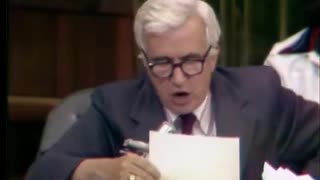 3:50:14
3:50:14
The Memory Hole
6 months agoNixon Impeachment Hearings Day 2 (1974-07-24)
1.2K -
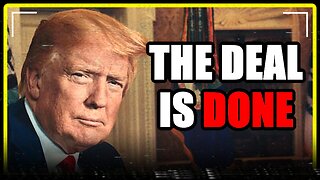 10:05
10:05
MattMorseTV
4 hours ago $0.85 earnedHe actually did it...
4.59K8 -
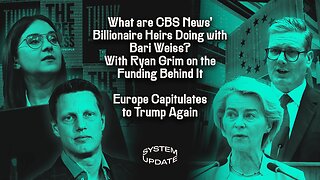 1:17:18
1:17:18
Glenn Greenwald
1 day agoWhat are CBS News' Billionaire Heirs Doing with Bari Weiss? With Ryan Grim on the Funding Behind It; Europe Capitulates to Trump Again | SYSTEM UPDATE #494
68.4K27 -
 LIVE
LIVE
megimu32
1 hour agoOTS: Movie Tie-In Games + Remakes: Let’s Play Memory Lane
54 watching -
 DVR
DVR
RiftTV
2 hours agoCNN Calls Black NY Shooter WHITE, Cincinnati FATIGUE | The Rift | Guest: Braeden Sorbo, 2Protects1
11.8K9 -
 LIVE
LIVE
LumpyPotatoX2
3 hours agoKilling Floor 3: Rampage & Chaos - #RumbleGaming
58 watching -
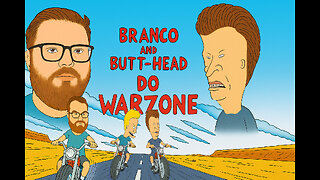 LIVE
LIVE
BrancoFXDC
3 hours agoPlaying Ranked Warzone - Pursuit of Diamond Rank
84 watching -

Omar Elattar
4 hours agoThe Brain Experts: "Your Overthinking Problem Has A Physical Solution & We Can Show You!"
77 -
 LIVE
LIVE
Mattnifico
3 hours agoREPLAYING EVERY FORZA HORIZON GAME - Forza Horizon 1 (Part 2)
19 watching -
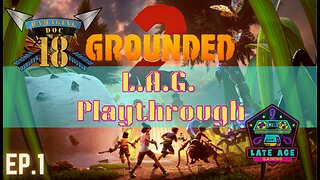 LIVE
LIVE
DamagingDoc18
35 minutes agoTime to get small! Grounded 2
9 watching